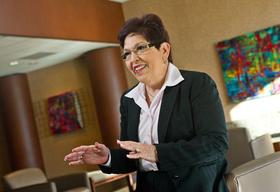1-2-12 St. Louis Business Journal
by Jeremy Nulik

- The World Trade Center St. Louis’ Ana Romero-Lizana said lexicon and cash flow are the biggest hurdles to building business internationally.
After 30 years of international business experience with companies such as Caterpillar, Monsanto and Solutia, Ana Romero-Lizana thought she had seen everything. The native of Guadalajara, Mexico had developed a network of intimate business connections around the world. However, five years ago, when Romero-Lizana was approached about a position at the World Trade Center St. Louis, a nonprofit organization that helps local companies expand globally, she wondered how many St. Louis firms have the scale and sophistication to be serious players internationally?
“I was surprised to learn that there are over 2,000 St. Louis-based companies that do international business,” said Romero-Lizana, now the director of international business development at the World Trade Center. “Many of them are small- to medium-sized with five to 100 employees, but that is an impressive number of companies. And, the diversity of niche products we offer international markets is what makes our region strong.”
That strength is evident even during a down economy. According to Romero-Lizana, Missouri exports have increased to record-setting levels each year for the past five years. Missouri exports are up 3.5 percent year-to-date at $9.7 billion versus $9.1 billion in 2011.
Locally, international business interest has also grown under Romero-Lizana. Since she joined the World Trade Center, membership has tripled and now totals more than 150 companies.
For a St. Louis-based company, what are the advantages of taking business international?
For one, 95 percent of the world’s population is not in the United States, so your potential for growth is enormous. Your second advantage is that U.S. products have a reputation of high quality, so you can charge a premium price. And, once you create a customer base in another country, they are loyal to you. You will have customers for life.
What are the biggest mistakes you see companies make when they attempt to do business in other countries?
Lack of patience. In the U.S., we do things very fast and don’t take time to build relationships. In most other countries, they take time to develop long lasting relationships. So, you can’t push people to buy something. They want to do business with people they can trust. That is hard for smaller companies because that means it is going to take time and money to get sales. Another mistake is just not understanding cultural differences. At the World Trade Center, we create educational opportunities for both our members and nonmembers so they know the little things that can make or break a deal. Sometimes we bring in local nationals to teach how to behave within a certain market. Are you supposed to give a gift? How do you handle business cards? What are their public holidays? It comes down to respect for their culture.
What are the biggest hurdles to doing business overseas?
The first hurdle is the lingo. International business comes with its own lexicon and set of acronyms. It is easy to get confused. Cash flow is also a hurdle. Within the U.S., we may have 30 days to pay after shipping. But if you go overseas it may take 30 days for the items to arrive. So payments will be slower. The biggest hurdle really is knowing where to find all of the information you need. We try to help people to understand the language, culture and give them the resources to research and find countries that would like their products. We also make sure they are compliant with the laws. The U.S. has trade management and export controls that they want you to follow.
What questions should local business owners ask themselves before branching into international markets?
Is my product unique? Am I prepared to grow and can I scale to meet an increased demand? The last is an important question because you may get an order for 5,000 units at once and maybe that is not something you are used to. I would ask myself, am I committed to this? Where are my weaknesses? Can I sustain an international relationship for the long term? What is my competition doing? What am I going to continue to do that is unique to the market? Am I being profitable?
What St. Louis-based company exemplifies the right way to do international business?
The Hermann Oak Leather Co. has been in St. Louis since 1881. They just recently started selling their products to some European countries. Their strength is that they have a niche product and a unique nonmetal process, so it is superior to the competition. We helped them to research which countries would want their products. Then, they went to an industry show in Germany and established new customers.
